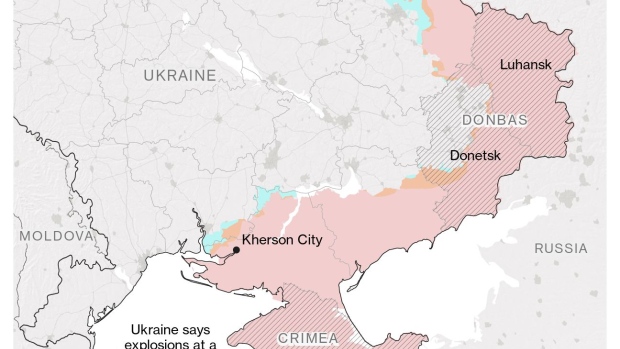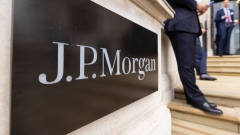Aug 17, 2022
Ukraine Latest: Zelenskiy Warns People Away From Russian Bases
, Bloomberg News

(Bloomberg) -- Ukrainian President Volodymyr Zelenskiy urged citizens to keep away from military facilities in areas occupied by Kremlin forces, including in Crimea, following Tuesday’s explosions at a Russian ammunition depot on the Black Sea peninsula.
“The fewer opportunities the occupiers have to do evil and kill Ukrainians, the sooner we will be able to end this war and liberate our country,” Zelenskiy said in his evening address. The blasts near the town of Dzhankoy in northern Crimea -- a week after explosions at an airbase on the peninsula destroyed fighter jets -- mark the beginning of a series of attacks, according to a Zelenskiy adviser. Russia attributed them to an act of sabotage.
Zelenskiy is due to meet with Turkish President Recep Tayyip Erdogan and United Nations Secretary-General Antonio Guterres in Lviv in western Ukraine on Thursday. A statement from the Turkish presidency said they will discuss “possible steps to end the Ukraine-Russia war through diplomatic means.”
(See RSAN on the Bloomberg Terminal for the Russian Sanctions Dashboard.)
Key Developments
- Ukraine Strategy Targets Russian Army’s Lifelines in Kherson
- Naftogaz Bondholders Reject Debt Restructuring Proposal Again
- East EU Slides Toward Slowdown as Russia’s War in Ukraine Bites
- Germany Has Enough Gas for Less Than 3 Months on Russia Cutoff
- Europe Gas Takes a Breather From Rally as Storage Fills Up
- Russia, Turkey Spar Over Air-Defense Sale That US Opposes
On the Ground
Russia struck the southern Odesa region with missiles overnight, destroying a recreation center and several private houses, Interfax-Ukraine reported, citing a spokesman for the regional military administration. Three people were wounded in the attack, according to preliminary information quoted in the Interfax report. Shelling continued in the east of Ukraine, including near Slovyansk, Kramatorsk and Bakhmut, Ukraine’s general staff said in its regular morning statement on Facebook. The “most intense” fighting is raging around several settlements close to the city of Donetsk, the commander-in-chief of the Ukrainian army, Valeriy Zaluzhnyi, said on Facebook.
(All times CET)
Naftogaz Bondholders Reject Debt Restructuring Proposal Again(6:42 p.m.)
Ukraine’s state-run energy company Naftogaz failed to win approval for its debt restructuring for the second time, according to a statement.
Holders of almost 80% of the $335 million of notes originally due last month voted against a proposal to restructure the debt, a result that will force the government to find another solution. Holders of bonds due 2024 and 2026 will have a second chance to vote on the proposal on Aug. 31 because they failed to reach a quorum.
Naftogaz went into default last month after the government, its sole shareholder, demanded the company freeze debt payments and use the money instead to buy natural gas for the winter.
NATO Urges Russia to Allow Nuclear Inspectors (4:15 p.m.)
NATO Secretary General Jens Stoltenberg called on Russia to allow urgent inspections by the International Atomic Energy Agency at the Ukrainian nuclear facilities in Zaporizhzhia, saying Russian forces there “raise the risk of a nuclear accident or incident.”
“The seizure of the Zaporizhzhia plant by Russian forces poses a serious threat to the safety and security of this facility,” Stoltenberg said following a meeting with Serbian President Aleksandar Vucic in Brussels.
Stoltenberg said the topic of the Ukraine war came up during his conversation with Vucic, adding it was “important the international community stands united in opposing Russia’s unprovoked aggression and that we all take steps to convince Russia to end this war.” Vucic has had close ties to Russian President Vladimir Putin and Serbia has not imposed sanctions against Moscow over the invasion.
Ukrainian Port Expects 5 More Crop Ships to Come Wednesday (4 p.m.)
The Ukrainian port of Chornomorsk is expecting five new vessels to be loaded with grain and vegetable oil Wednesday, reports Interfax-Ukraine, which cited the Facebook statement of Ukrainian Sea Ports Authority.
This number of vessels within a day is a record since the grain corridor started. Ships are to be loaded with a combined total of 70,000 tons of wheat, bran, sunflower oil and corn. The goal is to boost the sea export indicators up to 3 million tons of grain and other products with the number of vessels up to 100 per month.
European Coal Prices Jump to Record (12:45 p.m.)
European coal prices, which have risen more than threefold this year, surged to a record as Russian cuts in gas supply boost demand to help prevent blackouts. Benchmark futures for next year rose as much as 4.9% to $307 per metric ton on the ICE Futures Europe exchange.
While coal’s revival is hampering efforts to cut pollution, it underscores the critical energy situation in Europe, with limited gas supplies, France’s nuclear plants operating at half capacity, rivers running dry and a lack of wind.
Blast Impact on Tourism Seen Slight (11:30 a.m.)
Rail disruptions from this week’s explosions in Crimea may only reduce the number of tourists visiting the peninsula by 5%-10% because most visitors arrive by car, the Association of Tour Operators of Russia said in a statement.
However, some companies have reported a decline in new bookings by as much as a quarter, Interfax reported, citing a spokeswoman for a separate industry group. The number of tourists in the summer season may fall by as much as half because flights have been suspended, Interfax quoted the spokeswoman for the Russian Tourism Union as saying.
There have been long lines of cars seeking to leave Crimea since last week’s airbase explosion. RIA Novosti reported a record 38,000 cars traveling both ways on a bridge linking Crimea to Russia on Monday even before the most recent blast, which led to a temporary halt in rail traffic.
Russia Struggles to Ship Record Harvest (10:20 a.m.)
Analysts have progressively raised estimates for Russia’s wheat harvest as yields were buoyed by good weather, with the crop expected to reach an all-time high, but sales so far are running well behind the norm.
Russian wheat exports in July and August are estimated at 5.8 million tons, a “painfully slow” rate and 28% behind last year, according to research firm SovEcon. The invasion of Ukraine hasn’t triggered sanctions on food and agriculture, but has fostered logistical and financial constraints, with some banks and shipping companies opting to shun the region.
Erdogan to Table Diplomatic Solution to War (9:30 a.m.)
As well as possible diplomatic efforts to halt the war, Zelenskiy, Erdogan and Guterres will discuss increasing exports of Ukrainian grain to world markets, according to the Turkish statement.
Guterres will travel to the port city of Odesa on Friday and will later visit Istanbul before returning to New York, Stephane Dujarric, a spokesman for the secretary-general, said at a press briefing.
Uniper Loss Show Depth of Energy Crisis (9 a.m.)
Uniper SE provided more evidence of the scale of Europe’s energy crisis, with the bailed-out German utility reporting a net loss of more than 12 billion euros ($12.2 billion) in the first half of the year.
“Uniper has for months been playing a crucial role in stabilizing Germany’s gas supply -- at the cost of billions in losses resulting from the sharp drop in gas deliveries from Russia,” Chief Executive Officer Klaus-Dieter Maubach said in the firm’s earnings statement.
First WFP Vessel Leaves Ukraine for Africa (8:30 a.m.)
The World Food Programme said the first shipment by sea of Ukrainian wheat for humanitarian operations left the port of Pivdennyi Tuesday with 23,000 tons of grain for the famine-threatened Horn of Africa region.
“It will take more than grain ships out of Ukraine to stop world hunger, but with Ukrainian grain back on global markets we have a chance to stop this global food crisis from spiraling even further,” WFP Executive Director David Beasley said on the programme’s website. The UN organization says that a record 345 million people in 82 countries face “acute food insecurity.”
US Donates $68 Million to WFP (8 a.m.)
Secretary of State Antony Blinken said the US will contribute $68 million to the WFP to buy Ukrainian wheat to help “address the world’s pressing food crisis.”
“We’re committed to supporting global food security for the most vulnerable and call on all countries to follow suit,” Blinken said in a tweet.
©2022 Bloomberg L.P.







